Back
Back
Back
Back
Back
Each year, the Corporate Member Council recognizes CMC member companies that demonstrate best practices in their collaborative efforts with education to enhance engineering education. Companies are recognized for their excellence and innovation in one or both of the following:

Siemens, Shannon O’Donnell
Empowering equitable pathways through partnership
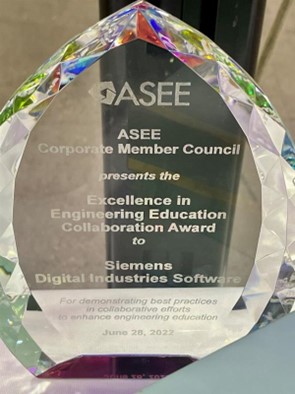
During ASEE’s Year of Impact on Racial Equity, Siemens Digital Industries Software partnered with the S.H.A.P.E. Community Center in Houston, TX and Houston Community College to empower children (5-15) and demonstrate how engineers make the world a better place through creative problem-solving.
The Keysight RF/Microwave Industry-Ready Student Certification Program
For demonstrating best practices in collaborative efforts with education to enhance engineering education
(Architecture and Systems Engineering: Models and Methods to Manage Complex Systems Program)
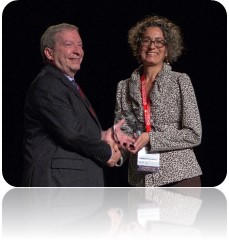
The trend is clear, technology innovations will increase at even faster rates in the future. For industry, these innovations will continue to drive time-to-market pressures and the need for productivity gains. Universities can help by producing engineers ready to step-in and be productive from day one-industry-ready engineers knowledgeable of the tools and processes used in the industry today. This allows industry to hire with confidence knowing that the productivity of the new employee is assured. The Keysight RF/Microwave Industry-Ready Student Certification Program provides a collaboration between industry and universities to produce and recognize industry-ready engineers.
Key to success, the program becomes integrating into the curriculum. Participating universities must use one or more Keysight EEsof design tools (Advanced Design System (ADS)), Genesys, SystemVue, EMPro, IC-CAP) accompanied by Keysight instrumentation for the measurement of their RF and Microwave devices (NWA, sources, receivers, oscilloscopes, etc.). The student then becomes involved in the design, building, measurement, and analysis of RF and Microwave components to help students gain real-world understanding of RF and Microwave design and measurement techniques.
Award presented to: Boeing, NASA, MIT, and edX
Recognized for demonstrating best practices in collaborative efforts to enhance engineering education.
Program: Architecture and Systems Engineering: Models and Methods to Manage Complex Systems
“Architecture and Systems Engineering: Models and Methods to Manage Complex Systems” is a four-course online program leading to a professional certificate from MIT, developed in collaboration with Boeing, NASA, and EdX. This certificate program blends industry practice with academic theory in systems thinking through competency-based training and is delivered via EdX. The program is open to the public and learners have the flexibility to enroll in either an individual course (4-5 weeks in duration) or to pursue the professional certificate. The online delivery of the program allows for flexibility for working professionals as content can be accessed anytime, anywhere. The content deeply engages learners and maximizes learner outcomes via videos, individual and team projects, readings, discussions, ungraded / graded problems, peer review, and self-assessment.
The Aerospace Partners for the Advancement of Collaborative Engineering (AerosPACE) program is a multi-disciplinary, multi-institutional, industry-academia collaboration to provide real-life, hands-on learning and capstone design experiences to graduates and senior. In addition to developing curriculum the consortium is using and developing a collaborative Computer Aided Design (CAD) software and social learning website using unobtrusively mined data from both for engineering education research. AerosPACE combines best practices from multiple areas of research into one program. The program was launched in August 2013 and 36 students from four universities are currently enrolled. It was preceded by a pilot project with 16 students in 2012-2013 and a technical feasibility study with 10 students in the spring of 2012.
Contacts for additional program information:
Dr. Michael C. Richey, Associate Technical Fellow, The Boeing Company
Dr. Gorrell, Lead Professor, Brigham Young University
Fabian Zender, Program Integration Manager, The Boeing Company
Driving SCIENCE
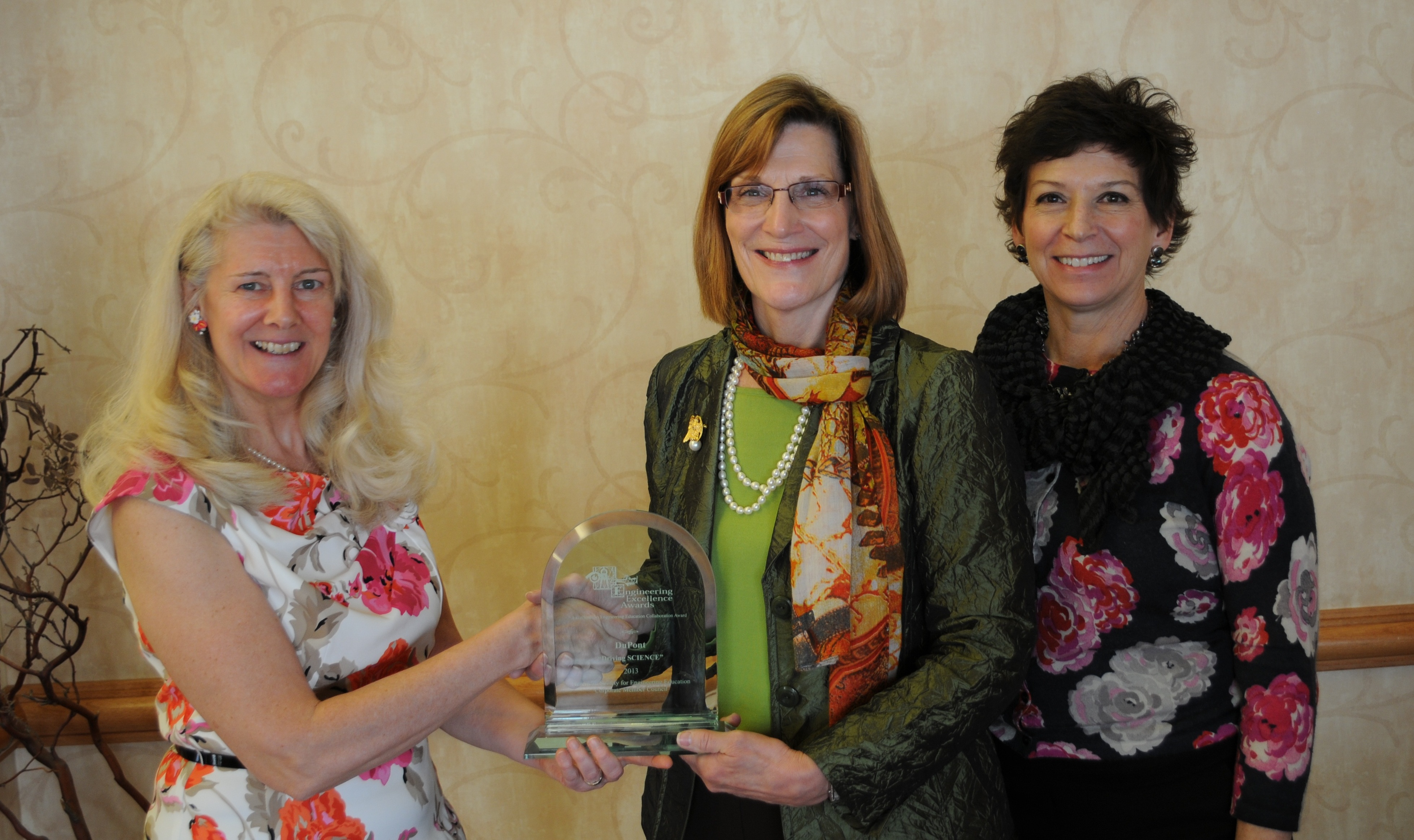
From left to right: Terri Morse, Immediate Past Chair of the ASEE CMC, Letha Hammon, CMC, Director - Diversity in Engineering Education, and Diane Matt, Chair of the ASEE CMC.
Driving Science is an innovative program that connects educators with the business community in the world of motorsports. Goals of Driving SCIENCE are to engage diverse communities in best practices of STEM education through professional development and curriculum resources; develop awareness of STEM careers that link to motorsports, focusing on safety, sustainability, and innovation; and build partnerships between K-16 education community and private enterprise. The impact of Driving SCIENCE in its first year includes connecting STEM education to 5 NASCAR race weeks, providing STEM professional development for 125 teachers from 21 school districts in 8 states; and impacting 18,750 students.Through DuPont's partnership with the United States Conference of Mayors to assist mayors in promoting and inspiring student interest in science and engineering, teachers from urban schools in Orlando and Philadelphia participated in Driving SCIENCE. This partnership will expand to additional cities in 2013. The professional development, facilitated by faculty from the College of Engineering and Science at Clemson University, consists of three days in classroom, on-site racetrack experiences and attendance at a race.
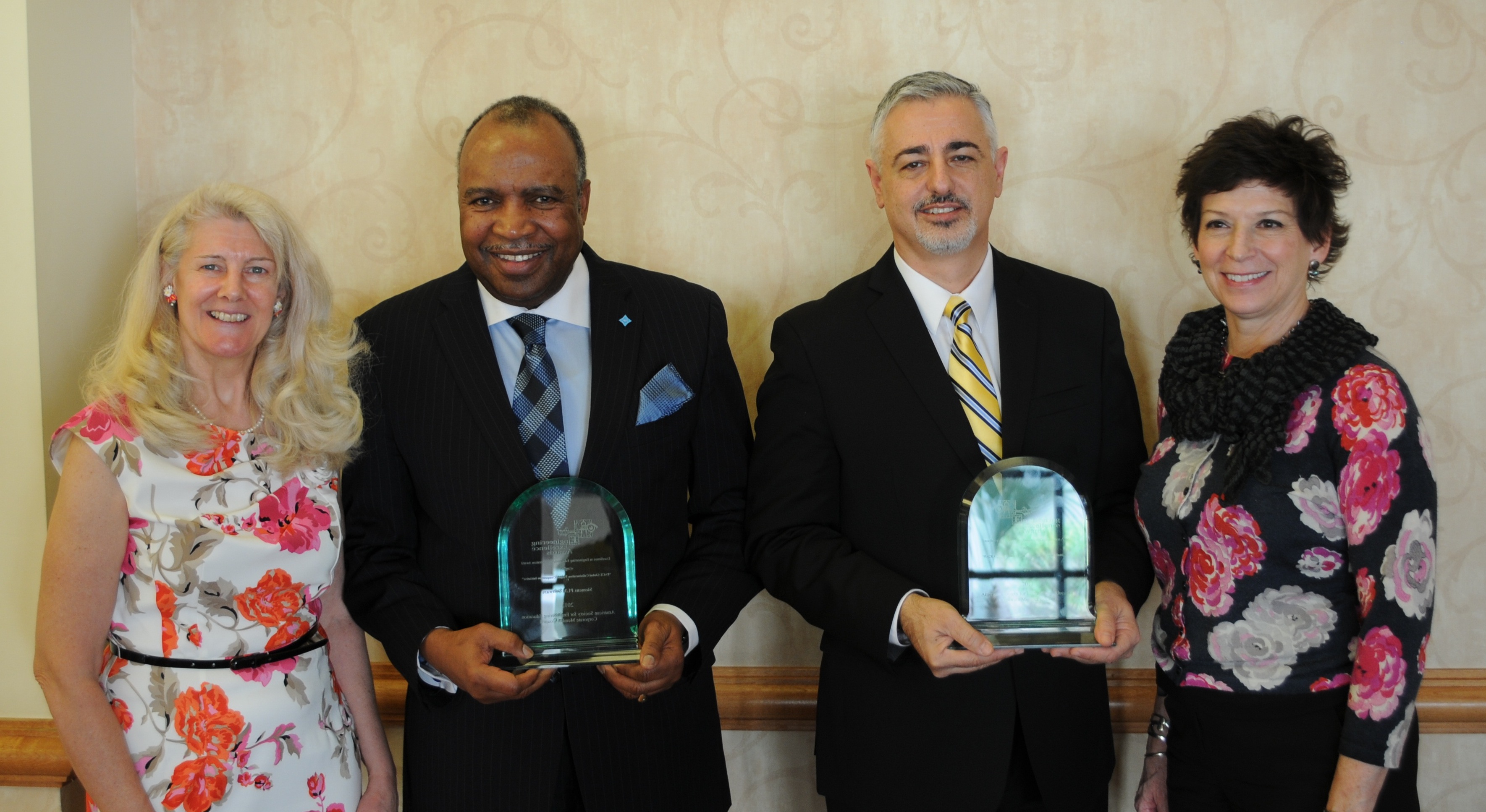
From left to right: Terri Morse, Immediate Past Chair of the ASEE CMC, Hulas King, Vass Theodoracatos, and Diane Matt, Chair of the ASEE CMC.
Since 2010, when PACE received its first 2010 ASEE/CMC Excellence in Engineering Education Collaboration Award, a competition format was initiated. The goal of the competition is to improve the global collaborative student experience across cultures, languages and time zones by:
The Boeing Company, Northrop Grumman and the Aerospace Corporation are three CMC members that are among the seven founding partners of the Cal State L.A. Professional Practice Program. They have been instrumental in assisting the College of Engineering, Computer Science, and Technology at California State University Los Angeles develop a world class industry-sponsored Professional Practice Program. The program provides students with a capstone experience in which to apply their theoretical knowledge to real applications. The structure of the program exposes students to an industry setting and working with a real, industry partner client to develop and deliver a client-defined product. This product may be a physical prototype, software package, or operational algorithm. The College of Engineering, Computer Science, and Technology at California State University, Los Angeles has fully integrated this program into the core curriculum. The program creates teams that are interdisciplinary across the engineering disciplines as well as the department of computer science, and technology. All students must complete this program in order to receive a Bachelor of Science degree. Since 2008, approximately 300 students have completed the program. For more information,http://www.calstatela.edu/academic/ecst/senior_design/
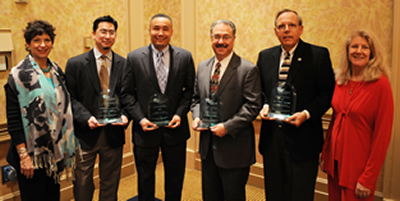
From left to right: Dianne Matt, ASEE CMC Awards Chair, Chris Higa, Northrop Grumman, Keith Moo-Young, Cal State L.A., Andrew Bicos, Boeing, William Uttenweiler, Aerospace Corporation, Terry Morse, ASEE CMC Chair
GE Foundation Developing Futures™ in Education
General Electric
Launched in 2005, Developing Futures™ aims to enhance math and science curricula, because research shows (and the GE Foundation’s previous efforts in education reform confirms) the biggest predictors of college readiness and matriculation to a college degree—regardless of race or ethnicity—is the taking of higher level courses in math and science. Developing Futures™ is designed to ensure that the math and science curriculum being taught to students is not only high quality and high rigor but equitably distributed across the board to all students. The program establishes a long-term commitment to six urban districts in which GE maintains a significant presence: Louisville, KY; Cincinnati, OH; Stamford, CT; Erie, PA; Atlanta, GA; and New York, NY.
http://www.ge.com/foundation/developing_futures_in_education/index.jsp
DaVinci Charter High School Program
Northrop Grumman and the Wiseburn School District
This program is a result of Northrop Grumman (NG) working closely with the Wiseburn School District in Hawthorne, CA for more than two decades on various K-8 programs. In 2007, they discussed the concept of establishing a Charter High School in the District. The result of this collaboration was launched in 2009, the DaVinci Charter High Schools include a Science HS and a Design HS on the same campus both utilizing Project Based Learning. The high school benefits from extensive collaboration with local universities, as well as, Project Lead the Way. It currently impacts 600 students in grades 9-11, with ~50% females, ~55% Hispanic, ~20% African American and ~10% Asian American.
Partnership in Advanced Materials Education
The Boeing Company and the University of Washington
To address the competency shift from metals to composite structures, the Boeing Company partnered with the University of Washington (UW) to develop multiple certificate programs in Aircraft Composite Structural Analysis and Design (ACSAD), Aircraft Composite Materials and Manufacturing (ACMM), and Modern Aircraft Structures (MAS).These state-of-the-art training courses integrate cooperative learning methods through academic–industrial partnerships and are taught by UW faculty and industry subject matter experts. It includes “theory to practice” opportunities to a) attract incumbent engineers and b) extend the STEM pipeline through attracting new engineering students.
http://www.engr.washington.edu/epp/acsad/
http://mae.uw.edu/composites/
National Collegiate Team Tech Competition
Society of Women Engineers (SWE) and The Boeing Company
The SWE “Team Tech” competition created, sponsored and facilitated by Boeing was established to emphasize the key role of teamwork and interface with industry in the engineering educational process and specifically provides a hands-on learning experience for undergraduate collegiate students to work directly with a multi-disciplinary team on a real life industry problem. Since its inception more than 50 different schools and companies and over 1000 students have participated.
http://societyofwomenengineers.swe.org/index.php?option=com_content&task=view&id=13&Itemid=121
Partners for the Advancement of Collaborative Engineering Education (PACE) and Siemens PLM Software, General Motors Company, Autodesk, Hewlett Packard, EDS and Sun Microsystems
“PACE”, through its six primary partner companies and 13 contributor companies has contributed over $9 billion in software, hardware, training, IT consulting services, and grants to 52 universities in 10 countries around the world to develop the automotive Product Lifecycle Management (PLM) team of the future. PACE integrates game-changing math-based tools and technologies into the creative design, engineering, and manufacturing curricula of key academic institutions.
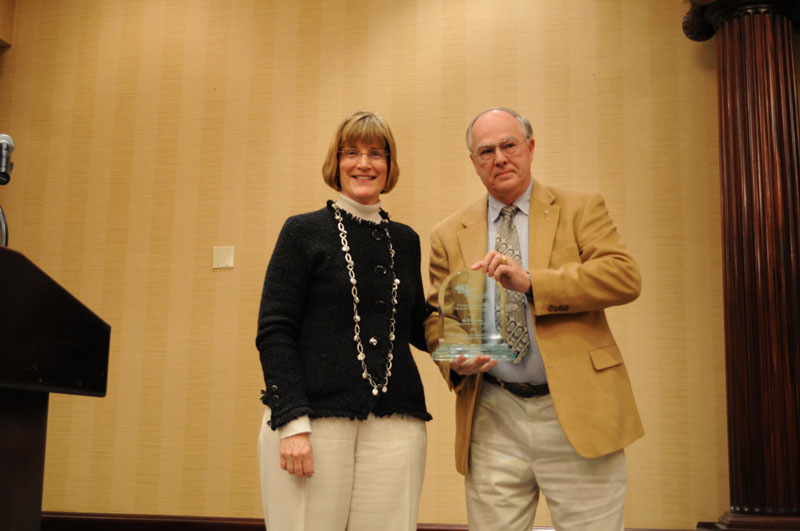
CMC chair Letha Hammon, DuPont and Ray Morrison representing ACETS Engineering Activities for All Americans
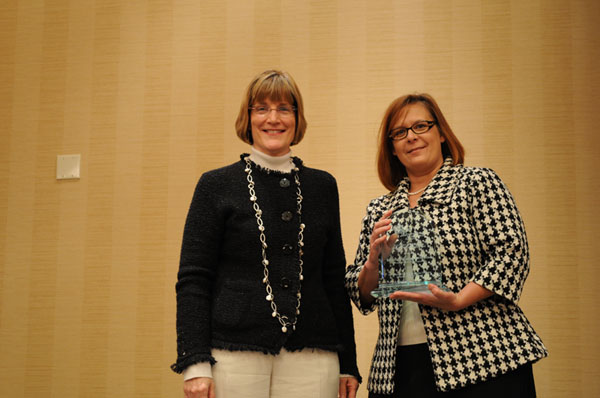
Letha Hammon, DuPont, and representative from Freescale Semiconductor, Inc., Freescale University Programs
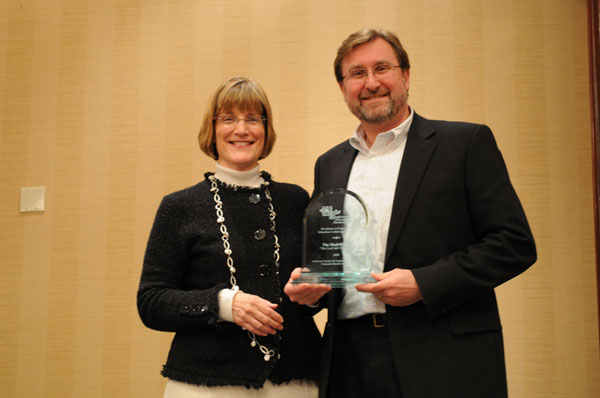
Letha Hammon, DuPont and Peter Janzow, MathWorks, representing The EcoCAR Challenge
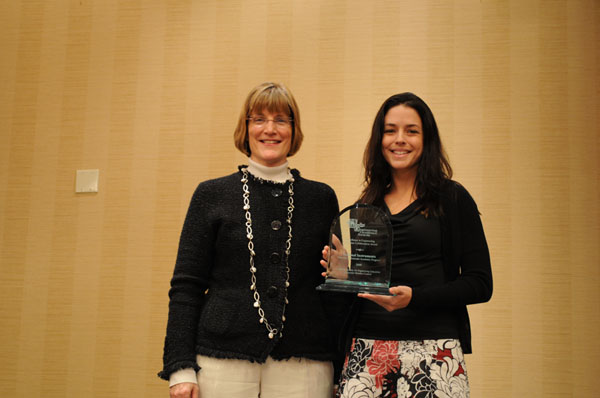
Letha Hammon, DuPont, and representative of National Instruments Academic Program
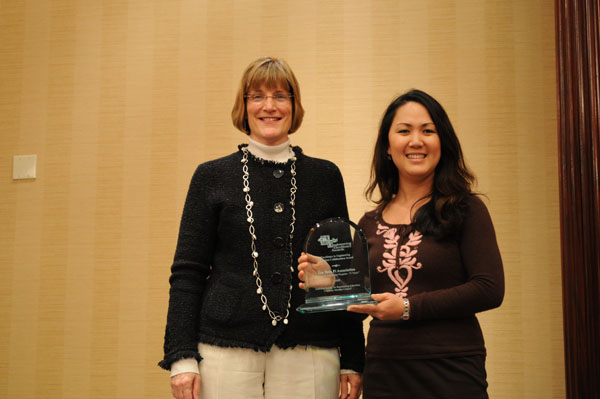
Letha Hammon, DuPont and Solange Dao, representing Tau Beta Pi Fellowship Program – 75 Years!
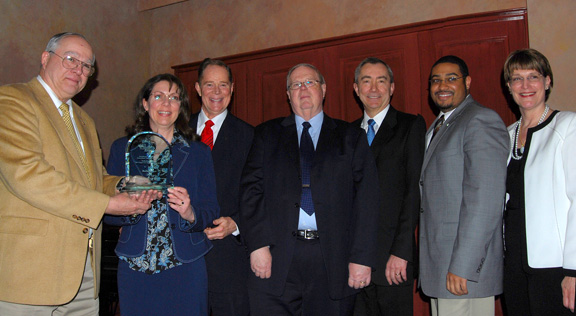
Rolls-Royce team accepting award from Ray Morrison.
Rolls-Royce was recognized for their collaboration with the Purdue University College of Technology in West Lafayette. The result was a Purdue Masters Degree program to advance analytical and problem-solving skills in technology applications and enhance the technological focus of the Rolls-Royce engineering workforce. A customized curriculum was developed and delivered that incorporates industry expectations of Six Sigma and Lean manufacturing, project and financial management and ethical realities.
Autodesk FIRST Robotics Program Collaboration
For more than 15 years, Autodesk has been a key supporter of the FIRST Robotics Competition (For Inspiration and Recognition of Science and Technology). The FIRST mission is to inspire young people to be science and technology leaders by engaging them in exciting mentor-based programs that build science, engineering and technology skills while inspiring innovation. FRC is an exciting, multinational event that places professionals and young people together in a team environment to solve an engineering challenge in an intensely competitive way. Each year Autodesk donates millions of dollars of financial assistance, free software and training to FIRST program participants. Recently Autodesk also helped FIRST by creating and hosting FIRSTbase, an online community and resource website where teams can download free software and access training. The majority of FIRST teams now use FIRSTbase routinely in their activities. Autodesk’s support of FIRST has been instrumental to the growth of the program and has fueled the ambitions of thousands of aspiring engineers and inventors.
SAE International “A World in Motion” Program
In 1986, SAE International, the world’s largest professional association of mobility engineers, created A World in Motion® (AWIM), a program designed to encourage K12 students to study science, technology, engineering and mathematics. The program’s primary goal is to attract and motivate students to help maintain a competitive edge in technology, research and development, and the applied sciences. AWIM brings math and science to life through highly interactive learning experiences that incorporate the laws of physics as they relate to motion, flight and electronics. AWIM curricula are designed around grade level-appropriate, math, science and technology standards. Since 1991, more than 60,000 kits have been shipped – all free of charge – to all 50 states and the District of Columbia, nine of 13 Canadian provinces and territories, and Puerto Rico. SAE estimates that nearly four million students have participated in the AWIM program.
SAE International “Collegiate Design Series”
The SAE Collegiate Design Series is a ground-up design and engineering competition that attracts teams of college students from around the world – 49 countries are represented from six continents. SAE Collegiate Design Series events are now held on six continents. In 2007, nearly 6,000 students on 684 teams competed in one of the five series: Formula motorsports; Baja offroad; Aero Design radio controlled; Clean Snowmobile Challenge; and the Supermileage vehicle design.
SolidWorks Corporation Collaboration with Worcester Polytechnic Institute
At WPI, SolidWorks’ support has played a critical role in launching and growing three programs aimed at getting students interested in engineering earlier in their education by participating in local and national robotics competitions. By providing financial assistance, training, software donations and expertise, SolidWorks has helped these programs to receive the resources they need to achieve success. SolidWorks provides hands-on teacher training, and employees work with WPI students who act as mentors for the middle school and high school teams. This approach gives WPI engineering students valuable hands-on experience in collaboration and teaching CAD fundamentals, while enabling high school students to benefit from past competitors’ experiences
Tau Beta Pi and the Engineering Futures Program
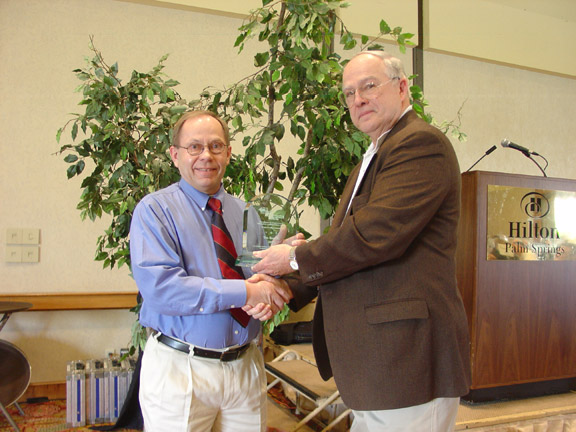
Larry Simonson, Tau Beta Pi (left) accepts the award from CMC Chair, Ray Morrison.
The Tau Beta Pi is recognized for their work in developing critical interpersonal skill sets and leadership capability in the future engineering workforce. The Engineering Futures program features on campus presentations by Tau Beta Pi alumnus trained in materials on people skills, team chartering, analytical problem solving and group process. An average of 206 sessions were presented by Tau Beta Pi facilitators and students for each of the past three years reaching 3,104 students. For more information on the Engineering futures Program go to: http://www.tbp.org/pages/About/Programs/EF/EF.cfm
DuPont and the “Miracle Workerz” program.
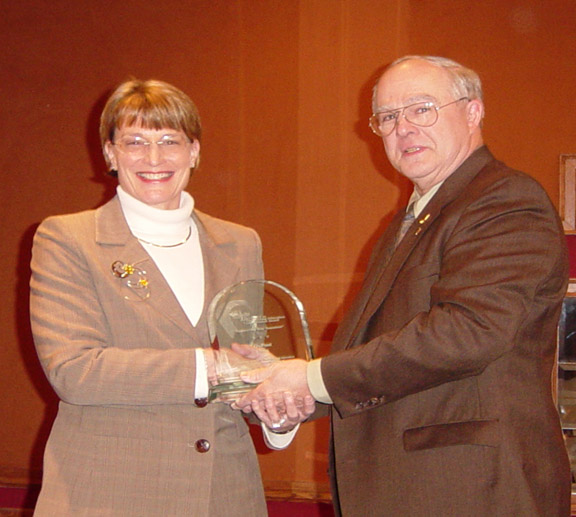
Letha Hammon, Dupont, accepting award from CMC Chair Ray Morrison
Dupont is recognized for their partnerships that are promoting an interest in science and technology among high school students in Delaware and the surrounding region. Under the umbrella of the “Miracle Workerz” program, five DuPont businesses joined forces to launch a FIRST Robotics team called “MOE.” To ensure sustainability, they established the FIRST State Robotics, Inc., a non-profit foundation. Partners include Astra-Zeneca, Wilmington Trust Company, the Home Depot, FMC BioPolymers, Interland Inc., Sheet Metal Contractors, and Airline Hydraulics plus a host of other local businesses that support the MOE Robotics team.
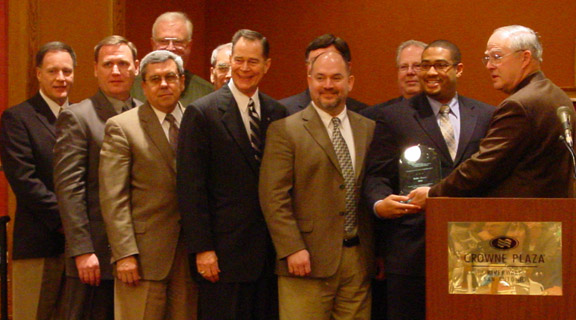
The Rolls-Royce Building the Innovation Generation team accepting award from CMC chair Ray Morrison.
Rolls-Royce is recognized for their role in developing a high caliber technical workforce in Indiana through the “Building the Innovation Generation” (BIG) program. High School students in Project Lead The Way courses work on technical projects interactively with Rolls-Royce engineers. They gain experience in GQE techniques and develop their technical writing and presentation skills. Rolls-Royce collaborates with partners such as Project Lead The Way (PLTW), the Indiana State Department of Education, the Indiana Department of Workforce Development, Purdue University, and the National Collaborative for Graduate Engineering Education Reform to provide leadership and continuously develop and refine the program.
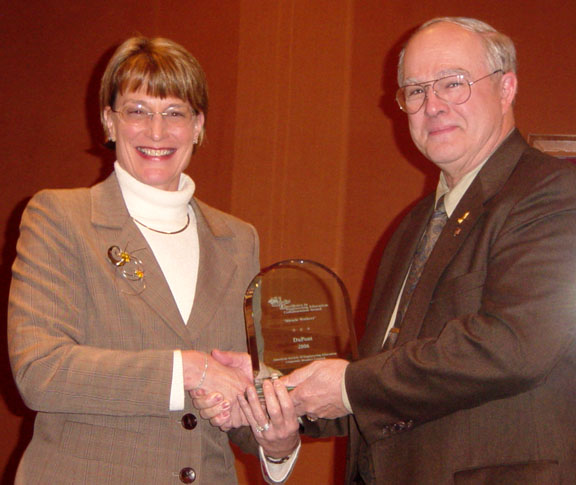
Photo caption: Letha Hammon, DuPont Company accepting award from CMC chair Ray Morrison
The DuPont Company is exposing Girl Scouts in Delaware and the surrounding region to professional women who are role models for careers in mathematics, science, and engineering through their Engineering Your Tomorrow program.
The DuPont Engineering and Central Research and Development group partners with the Chesapeake Bay Girl Scout Council and the Freedom Valley Girl Scout Council to engage Girl Scouts, parents and troop leaders in hands-on activities to explore engineering and career opportunities. Thousands of young women have benefited over the past 18 years since this program was first launched by DuPont women in engineering and science.